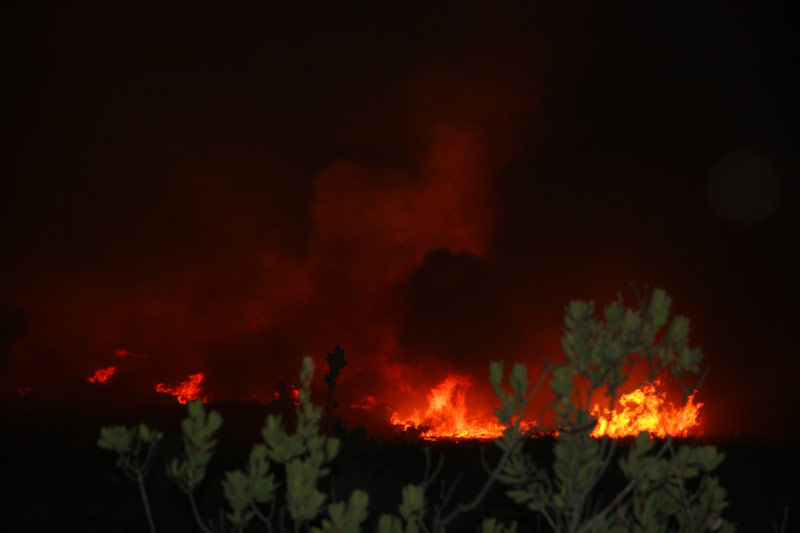A large veld fire broke out in the Algeria area in the central Cederberg a few weeks ago. It had no impact on our farming region in the Northern Cederberg but is a reminder of the veld fire risks in our region. It’s very difficult to tackle these fires in the mountains due to the terrain. Preventing them from being ignited in the first place is definitely the way to go. The following article was originally published in the Cape Times on February 10, 2009, and was written by journalist Melanie Gosling:
A wildfire, thought to have been started by buchu poachers, that swept through farms and the Algeria forest station in the Cederberg at the weekend, has destroyed orchards and buildings and caused around R27-million in damage.
CapeNature described the fire as an “ecological disaster” as it destroyed about 6 000ha of fynbos that had been burnt only eight years earlier.
Some of the fynbos species, such as proteas, don’t reach reproductive maturity until 12 or even 15 years old.
Frequent burning could lead to plant extinctions
The fire began in the early hours of Friday and burned for two days, destroying thousands of citrus and mango trees and 150ha of pine trees, and gutting the historic office at the Algeria forest station.
The fire was one of 14 that have burned in protected conservation areas across the Western Cape in the past seven days. CapeNature suspects many of them broke out because of human negligence, and is to call in an independent fire investigator to determine the cause and origin of the Cederberg fire.
Jaco Rheeder, CapeNature business unit manager for Cederberg Megapark, said on Monday that the fire had swept across eight or nine kilometres of veld in 30 minutes.
“It went through the 150ha of pine plantations at Algeria in about five minutes. The wind was unbelievable,” he said. “The office building, which was built in the 1930s and had old cedar floors and ceilings – that’s gone.
“The fire burned in a V up the valley and stopped only at the burnt bit at Uitkyk Pass. This fynbos was burnt eight years ago, so to have such young veld burn again is an ecological disaster,” Rheeder said.
“We’re sitting here now with no water, no electricity, no telephones.”
Loss to Infrastructure and Tourism
Fanie Bekker, CapeNature executive director of operations, said an estimated R21-million had been lost in damage to infrastructure and tourism income.
Jannie Nieuwoudt, owner of Jamaka Organic Farm near Algeria, said he had lost about R3-million.
“The fire was on CapeNature land in the buchu lands about 300 metres above our fence. There is no firebreak,” he said. “We’re pretty sure buchu poachers started it. We grabbed all our fighting gear and tried to keep it from the orchards. The Clanwilliam fire brigade helped us a lot, but in the end we couldn’t stop it from jumping the road. When it got into the orchards, they were just gone.”
“I had 10 000 citrus trees. I’ve got 700 left.
“About 2 000 mango trees were destroyed, and that’s a very valuable crop because it ripens out of the normal season of the Mpumalanga and KwaZulu-Natal mangoes.”
Dale Morgan, disaster manager for Clanwilliam, said there had been about R6-million damage to farms and outbuildings.
“At least we saved the farm houses. We got it under control at one point, but then the wind picked up and there was basically nothing we could do,” Morgan said.
“But there’s still a God and that little bit of rain on Saturday night helped us.”

